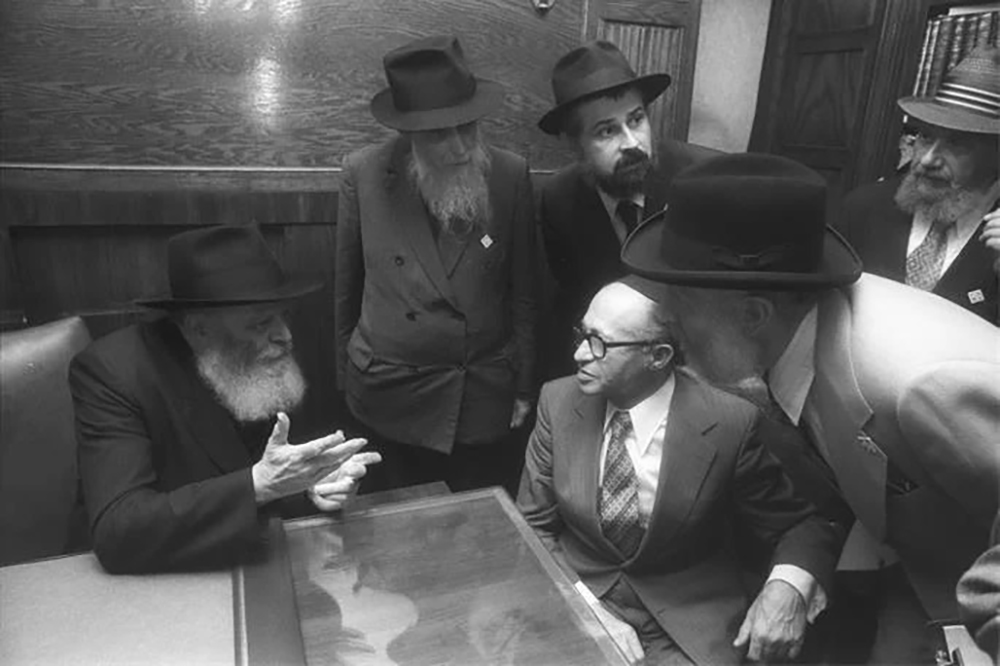|
Getting your Trinity Audio player ready...
|
The Torah grants Israel to the Jews and obligates them to protect her people
By: Dovid Margolin
We thought we lived in a modern world. A world where murdering Jews in cold blood, where the mass slaughter of innocent men, women and children—babies!—in their homes and on their streets was unthinkable. We thought killers leaving the mutilated corpses of entire Jewish families in ditches and marauders taking Jewish captives was a thing of the past. Sure, bad things happen to good people, and every Jew knows he or she is potentially a target solely for their Jewishness, but that a civilized world that preaches “justice and righteousness” could equivocate, or tolerate, or even support such a thing? Today? Impossible.
We were wrong.

The truth is, somewhere deep down we knew this, and always doubted the modern world’s assurances that we were safe. That’s why we obsessed over the past, reading books on the Holocaust, on Stalin, on the pogroms, on the Crusades; why we built museums and created curricula; why we educated and spoke. We joked about it, too, that dark Jewish humor that contains a wisdom none of the museums could ever communicate.
And in the back of our minds, we knew that we had an option: Israel. It was in fact the threat to Israel and its millions of Jews in 1967 that had first reawakened our visceral sense of vulnerability. “We shall not enter Palestine with its soil covered in sand, we shall enter it with its soil saturated in blood,” Egypt’s President Gamal Abdel Nasser declared in May of 1967. One week later, we watched as he ordered United Nations peacekeepers out of the Sinai and Egyptian soldiers took up their positions, readying to make good on their vow to annihilate the Jews. We saw then how the world remained silent, again.
Then came that glorious victory, and with it a sense of liberation from a dark history. In six brilliant days Israel—the Jews, really—showed they could fly and outmaneuver their opponents, outsmart their enemies, destroy their tanks and their morale.
At first we were moved by the images of Jewish warriors breaking down in tears as they approached the Western Wall, recognizing that only G‑d Almighty could have delivered such a miraculous victory over eight Muslim armies poised to crush the Jews and push them into the sea.
Over time, we forgot.
Look, Jews are smart and inventive; why shouldn’t we have the mightiest military in the Middle East and one of the most sophisticated intelligence apparatuses in the world? And so, slowly but surely, we began to believe—each of us in our own way—that “[it is] my strength and the might of my hand that has accumulated this wealth for me.”1
Because Israel was strong, every ensuing military setback was crowned by an eventual victory. Because Israel was not only strong, but also moral, it could afford to set out on “brave” quests for peace, offering swaths of strategically vital land in return for pieces of paper.2 And in recent months, because Israel was strong, the Jewish people felt it could afford to bitterly divide itself over trifling politics.
What was there, really, to be afraid of?
On the Precipice
On Oct. 7, 2023—Simchat Torah in Israel—we learned, to our everlasting horror, that the modern world does not exist, that savage murderers reminiscent of the Middle Ages are alive and more bloodthirsty than we could imagine, and that our Jewish military is not invincible—far from it. We learned that not even the most well-meaning assurances of our allies could protect our brethren, and that “brave” quests for peace—whether Camp David, the Oslo Accords, the Wye River Memorandum, or, so obvious in this case, the 2005 Gaza disengagement, in which Israel voluntarily handed an ISIS-like terror group control of a swath of land adjacent to the homes and playgrounds of innocent Israelis—had led directly to the greatest slaughter of Jews since the Holocaust.

That’s where we stand today. For the first time since the early days of the disastrous 1973 Yom Kippur War, we’ve been forced to take seriously the existential threat to Israel’s existence.
But we’ve come to recognize other things, too. We saw how quickly the political differences that had divided the Jewish people fell away, how truly connected the Jewish people are all over the world—one body and one soul.
It is not an accident that the war began on Simchat Torah, the day when we rejoice in G‑d’s gift of the Torah to the Jewish people at Mount Sinai. It is the Torah that binds us together as one, and the Torah that connects us with G‑d. It is also the Torah that grants us a corner of the world called Israel.
For nearly half a century, the Rebbe, Rabbi Menachem M. Schneerson, of righteous memory, spoke and cajoled, cried and begged, that the Jewish people—from the leaders of Israel to the laypeople in New York—see their connection and claim to the Land of Israel not as a gift of the nations of the world, something conferred upon them by the United Nations, but as G‑d’s covenantal agreement with our forefather Abraham, as written clearly in the Torah—a holy book not only for the Jews, but for Christians and Muslims too. That our right to dwell in Israel, and to strongly protect ourselves—not only in Israel, but everywhere in the world—comes directly from G‑d, Creator of heaven and earth.
The joy of Simchat Torah is an expression of our faith and trust in G‑d. It reminds us that our fate depends not on our own military might, intelligence savvy or diplomatic know-how, but on G‑d Almighty, whose “eyes are upon the Land of Israel from the beginning of the year to the end of the year.”3
That same Torah introduced the world to the concept of one G‑d. There, He gave the world seven universal commandments including “Do not murder” and “Do not steal,” not as morals based on the whims of man, but as eternal commandments from a just and merciful G‑d. The Torah that commands man not to murder likewise stresses the vital importance of protecting the lives of the innocent, providing guidelines of how to fight wars and defend yourself when an enemy rises up to kill you.
For 75 years Israel sought to gain recognition in the eyes of the international community by insisting that it is a nation like any other. But it is not. October 7th was yet another reminder of that. As the Rebbe once pointed out to Yitzchak Rabin, the Jews are as the Torah describes them “a nation that will dwell alone, and will not be reckoned among the nations.”4
At this painful inflection point we know we cannot keep repeating the mistakes of the past, but neither can we despair. Instead, we must look towards the eternal Torah for guidance. The path to peace is likewise delineated in the Torah, a true peace—one that rests not on hopes and illusions, but on security. “The L-rd shall grant strength to His people,” King David wrote in Psalms, “the L-rd shall bless His people with peace.” The foundation of true and lasting peace is strength. Without one, you cannot have the other.5
“When the enemy nations of the world see true Jewish strength, not strength that emanates from ‘the strength and might of my hand’ but strength that comes from true faith in G‑d Almighty,” the Rebbe observed in 1968, “then they will dissipate on their own and not even approach to make war.”6

What follows is a brief overview of the Jewish people’s claim to the Land of Israel and its right—duty, in fact—to unapologetically protect the lives of all of her citizens, as delineated in the Torah and elucidated by the Rebbe.7
‘In the Beginning … ’
Everyone recognizes the famous opening words of Genesis 1:1: “Bereishit bara Elokim eit hashamayim veeit haaretz.” “In the beginning of G‑d’s creation of the heavens and the earth.”
The Torah is first and foremost a compendium of laws, and so the medieval master commentator Rashi immediately asks: Why does the Torah start here? Shouldn’t it have rather started with the very first commandment? Then he answers: “For if the nations of the world should say to Israel, ‘You are robbers, for you conquered by force the lands of the seven nations [of Canaan],’ [the people of Israel] will reply, ‘The entire earth belongs to the Holy One, blessed be He; He created it (this we learn from the story of the Creation) and gave it to whomever He deemed proper. When He wished, He gave it to them, and when He wished, He took it away from them and gave it to us.”
It is not incidental that we read Genesis from the Torah scroll on Simchat Torah, the day the war began.
The words written in Genesis, the Rebbe explained, are the foundation for the Jewish people’s claim to the Land of Israel—nothing else. The same G‑d Who created this world granted the Jewish people Israel, a promise reiterated 10 times in the Five Books of Moses, beginning with the covenant G‑d made with Abraham in the Torah portion of Lech Lecha. The only requirement is for the Jewish people to be proud of their identity, know and appreciate the facts written in the Torah, and then share them with the world.
And so the Jew has two ways of broaching the subject of his claim to the land with world powers: 1.) He can state, respectfully but emphatically, that he comes as a representative of the Jewish people to claim what is rightfully his, the Land of Israel promised and granted to the Jews by G‑d in the Bible; or 2.) That this was the land set aside by Lord Balfour as a national homeland for the Jewish people, to be a nation like any other; or perhaps this was what was granted the Jews in the UN partition, back when the world still felt a measure of guilt and pity following the Holocaust; or one of many other logical but debatable arguments.
The first option, the Rebbe explained, is obviously the better approach. The majority of the world believes in the Bible, and at the very least recognizes it and its value to the Jewish people. Balfour, on the other hand, might not be as universally appreciated (certainly not in 2023!). Neither will arguments about what happened in 1948 necessarily ring true to the non-Jewish listener, as compared with the basic facts laid out in the Bible itself. But to proclaim the Torah as the ultimate root of your argument requires a foundation of strong Jewish pride. When the nations of the world see that the Jews themselves truly believe it, they can accept that.
“The argument must be a true one, without a trace of dishonesty!” the Rebbe insisted. “Aside from the fact that dishonesty is against the Torah, such an approach [of relying on worldly sources for the Jews’ claim to Israel] will bring about the opposite of the intended results … . The non-Jew understands that this is not a [decades-old] argument but one that traces back to Mount Sinai, even earlier than that!”8
That the Jewish people’s claim to Israel stretches even further back than Sinai is reference to Abraham’s purchase of the Cave of Machpelah in Hebron from Ephron, a business deal whose parameters are extensively detailed in the Torah. (Other legal purchases enumerated in Scripture are Jacob’s purchase of a section of Shechem (Nablus) from its ruler Hamor, and King David’s buying of the Temple Mount in Jerusalem from Aravnah the Jebusite. That David chose Jerusalem as the Jewish capital 1,000 years before any of today’s religions stepped foot in the Holy City was also something the Rebbe pointed out often.)9
Indeed, at the Rebbe’s urging, in the winter of 1976 then-Israeli ambassador to the UN Chaim Herzog submitted the contract between Abraham and Ephron to the UN. “For the first time in history,” the JTA reported, “an agreement made almost 4,000 years ago and recorded in the Bible, has been issued as a United Nations document … .” The Rebbe told Herzog, who later became president of Israel, that his personal claim to Hebron was further bolstered by the fact that he was Levite, with Hebron being one of the cities designated for members of that tribe. Herzog’s son, Isaac Herzog, the current president of Israel, was also present during this encounter.
It is also important to note that the land was not given to any one individual, belonging neither to Israel’s political leaders nor elite, but is the collective possession of Jewish people—every single Jew. Thus no elected leader has the right to negotiate away any piece of the Holy Land, this quite literally being the theft of something that does not belong to him or her.10




